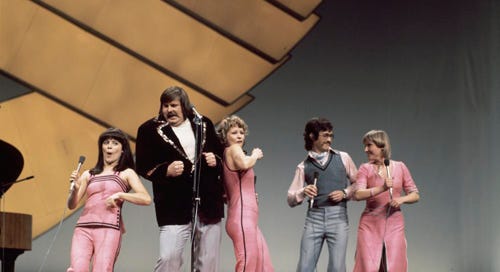Eurovision, English peasants and Irish in Brussels
A round-up of the latest language news from all over the internet + what we've been up to.
Hello linguaphiles, we hope the last few weeks have been good for you.
First of all, we must discuss Eurovision – one of the biggest linguistic events of the year. As you probably know, Ukraine came out on top with “Stefania” by Kalush Orchestra, as they received an outpouring of viewer support against the Russian invasion. Though the country has won the competition twice before, it was a historical moment, since it marked the first ever victory for a song in Ukrainian.
The number of acts choosing to sing in their native languages has seen a slight increase since last year, with 15 of 40 entries singing in languages other than English – including Lithuanian, and even Breton (France’s unsuccessful entry). Eurovision actually used to require contestants to sing in one of their country’s official languages back in the 1960s but this rule was revoked in 1973, giving way to the international success of acts like ABBA.
This month we were surprised to learn that YouTube polyglots are a thing, and a bit spooked by this piece on how A.I. is mastering languages. Meanwhile, Google has been working on its linguistic offerings: Google Translate has 24 new languages including Quechua and Paraguayan Guaraní, and Google Docs will soon suggest alternatives for words that “may not be inclusive to all readers”, such as “mankind” or “housewife” (“humankind” and “stay-at-home spouse” are the new mots du jour).
Our mornings have been spent reading Le Monde’s new English language edition, and our evenings watching Ten Per Cent, the British remake of the French TV show Dix pour cent (available in the UK on Amazon Prime). Reviews are mixed because, realistically, it was never going to beat the original, but that doesn’t make it less entertaining! Next on our list is Netflix’s Dirty Lines, the story of Europe’s first erotic phone line which was, of all languages, in Dutch – the world’s unsexiest language?
The word “peasant” doesn’t exactly bring romantic notions to mind, does it? Well, that may depend on the nationality of the peasant in question. As Katie Revell notes in Vittles newsletter, we tend to romanticise the idea of the peasant in other cultures (cucina povera anyone?), while the British peasant has been “removed of any sense of culture” and the word “relegated to the status of an insult”. In the same newsletter, Rosanna Hildyard called for better language to talk about farming (Jeremy Clarkson - “Britain’s most famous farmer” - calling his rams “woolly ball sacks” might need some rethinking).
Sticking with rural England, fancy hearing how someone might have spoken 70 years ago? Check out this new interactive audio map that researchers at the University of Leeds have created for British dialects. It reminded us of this project that studied Parisian accents back in 1912, and this piece that looks at the relationship between Italian and Neapolitan in the 1950s.
Languages and accents have evolved beyond recognition, so if you like, say like a lot, you’ll be glad to hear that this is actually a good thing. On the other hand, we agree that we should give the term “culture wars” a bit of a rest. (It’s being used to explain everything from the US abortion row to the plan to allow burkinis in French swimming pools). As for a word to include in your vocabulary? “Rashist”, a convenient blend of “Russian”, “racist” and “fascist”, is common in countries of the former Soviet Union and is undergoing a renaissance.
What we’ve been up to:
Writing: Manga has boomed in recent years in France, to the point that now half of all comic books sold in the country are mangas. For the May issue of Monocle, Julia went to the Angoulême International Comics Festival to find out why.
Listening: Aisling learned that Irish could soon be spoken more in Brussels than in Ireland on the podcast The Irish Passport. Since the language was given full parity as an official European Union language in January, job ads seeking Irish speakers have been popping up in the Belgian capital.
Watching: On a recent trip back home Julia went to Docs Barcelona and saw the documentary Navalny, which includes a jaw-dropping scene of the Russian dissident calling up the FSB agents who tried to kill him. It’s available on BBC iPlayer and HBO.
Reading: Aisling has been reading The Outrun, Amy Liptrot’s best-selling memoir of alcoholism and recovery set in the Northern Scottish Isles. It will soon be made into a movie starring Saoirse Ronan.
Dancing: Julia has been enjoying Métamorphose, the latest album by Swiss singer Vendredi sur mer. Upbeat, melancholic tracks “Le Lac” and “Monochrome” are particularly good for a post-dinner party boogie, while “Dormir” is for the trip back home on the métro.
Travelling: Aisling went to the little visited Italian region of Abruzzo, where she ate pasta, drank wine and was happily chauffeured around by her friend in a Fiat 500 they dubbed Gigi.
If you enjoyed reading this, please consider supporting this newsletter by buying us a coffee here.
Was this email forwarded to you? Click the button below to subscribe.
Aisling O'Leary is an Irish journalist based in London, where she works at The Telegraph. You can follow her on Twitter @JournoAsho
Julia Webster Ayuso is a Spanish-British freelance journalist based in Paris. Her writing has appeared in Time, The Guardian, The New York Times and Monocle. You can follow her on Twitter @jwebsterayuso





